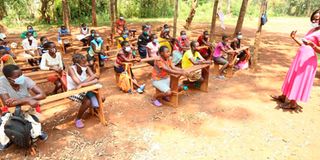I didn’t know unprotected sex leads to pregnancy

A mentorship lead takes girls through life skills training at Bar Anding’o Primary School in Kisumu last year. In Kenya, studies show that between 10,000 to 13,000 girls drop out of school each year due to pregnancy.
What you need to know:
- In Kenya, studies show that between 10,000 to 13,000 girls drop out of school each year due to pregnancy.
- Tabby regrets getting pregnant young. Had she known her life would turn out this way, she would not have had unprotected sex with her boda boda boyfriend.
When Tabby had sex at the age of 15, she did not know unprotected sex would lead to pregnancy.
She had started having her menses at the age of 12 but was not aware it was a sign of being reproductive.
“I knew it is normal for a girl to have periods, but I didn’t know what that meant. I wish someone had warned me early enough,” says Tabby, now a teen mother to a four-year-old boy.
At the time, she was a Class Seven pupil at a rural primary school in Matungu, Kakamega County. But she had to drop out to take care of her child. Her parents never bothered to take her back to school.
She is now a teen mother without a proper education or skill to secure her a job. Her mother is presently the provider of her son’s needs, as she struggles to get a placement as a domestic worker in a good home.
“I have worked in two different homes in five months. From January to mid-February, I worked for a woman in Utawala who denied me food. I was taking care of three children for a Sh5,000 salary a month,” she says.
Unprotected sex
“In the second home in the same area, the husband could pay me Sh6,000 and the wife would then ask me to lend her Sh1,000, other times Sh3,000 but become harsh when I ask for a refund,” says Tabby.
Tabby regrets getting pregnant young. Had she known her life would turn out this way, she would not have had unprotected sex with her boda boda boyfriend, she says. The man eventually denied being responsible for her pregnancy.
In Kenya, studies show, between 10,000 to 13,000 girls drop out of school each year due to pregnancy, many of whom end up seeking domestic jobs. Tabby is an example of just how difficult it is for them to work in humane environment with a decent wage. They, therefore, end up in a cycle of abject poverty.
In a May 27, Menstrual Health and Hygiene Amidst the Covid-19 Pandemic webinar, Inua Dada Foundation founder Ms Janet Mbugua, raised concern over an existing gap in dissemination of information on menstruation, a dearth leading to girls making uninformed choices.
“In 2020, Inua Dada spoke to a group of pregnant teens and teen moms and almost all of them said they could not link their pregnancy to their periods,” she said.
“The fact that in 2020 you have 14,15,16 year-olds who are pregnant and didn’t know they could get pregnant because of their periods means there is an information gap. We need to invest (in creating awareness about menstruation),” she said in the webinar convened by Centre for Rights Education and Awareness.
Period poverty, stigma
Global Menstrual Health and Hygiene Collective recently adopted a new terminology on menstrual health, which encompasses action to end period poverty and stigma.
Menstrual health is now defined as a state of complete physical, mental, and social well-being and not merely the absence of disease or infirmity, in relation to the menstrual cycle.
According to the Collective partners who include World Health Organisation (WHO) and United Nations Population Fund (UNFPA) menstrual health can be achieved if girls and women are provided with accurate, timely, age-appropriate information about the menstrual cycle, menstruation, and changes experienced throughout the life-course.
This is in addition to information on self-care and hygiene practices.
WHO, Sexual and Reproductive Health and Research, Director Dr Ian Askew, who spoke during a virtual Menstrual Health Symposium 2021 organised by UNFPA East and Southern Africa on May 26, said the new definition underscores the fact that menstrual health is a public issue and requires collective participation to ensure girls and women menstruate with dignity.





